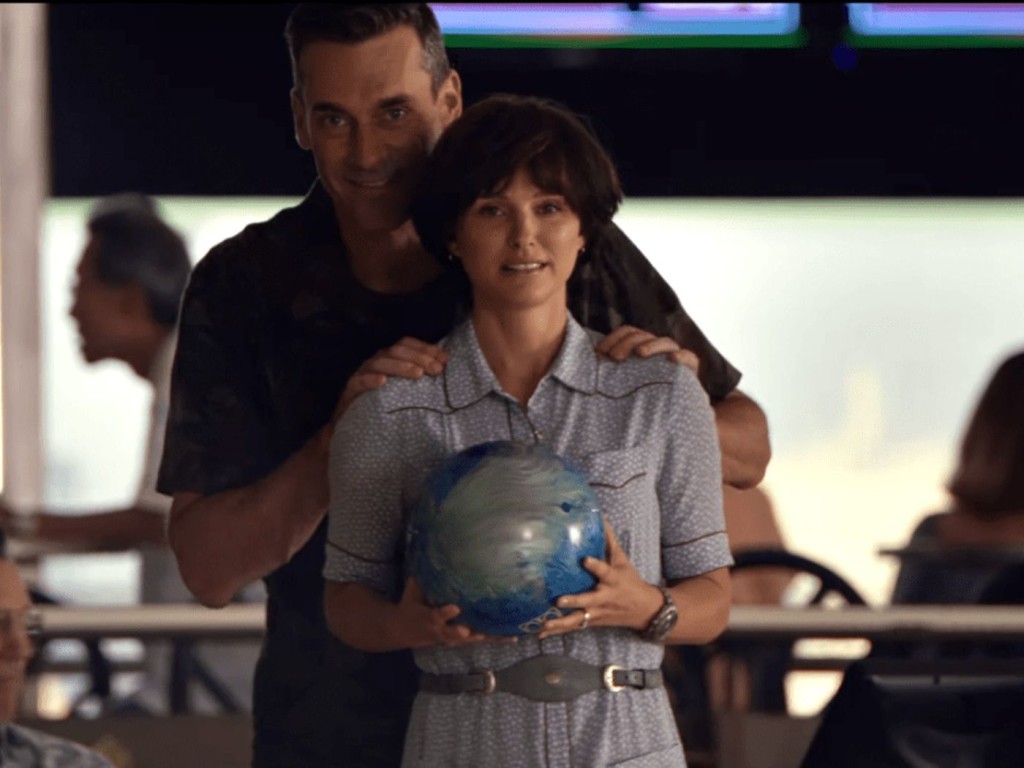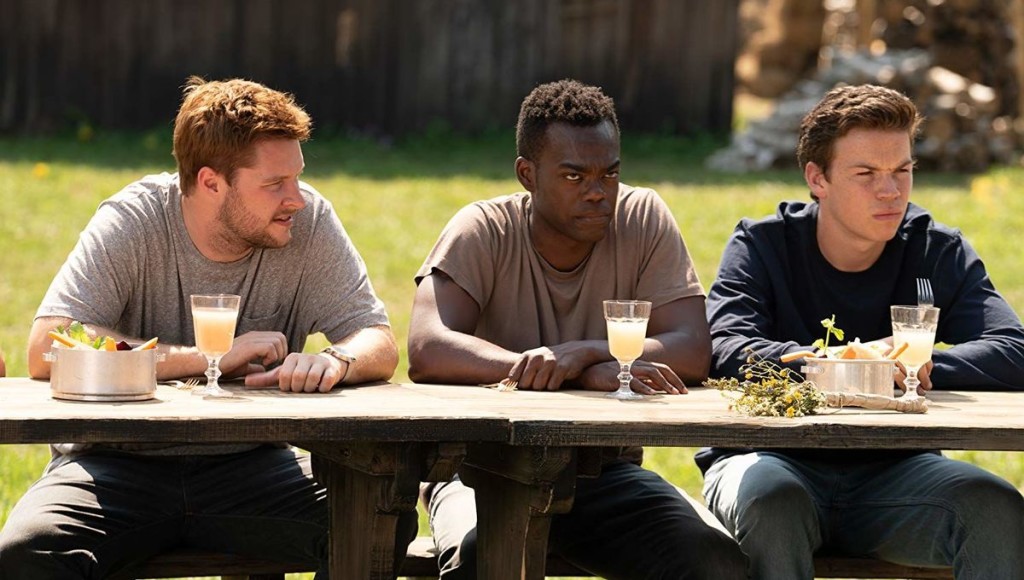Genre: Time Loop
Premise: A retired U.S. Army Special Forces veteran finds himself stuck inside the same day where a group of assassins hunt him down and kill him.
About: This script was originally written by Chris and Eddie Borey, who have a knack for high-concept ideas. Their last film, Open Grave, was about a man who “wakes up in the wilderness, in a pit full of dead bodies, with no memory and must determine if the murderer is one of the strangers who rescued him, or if he himself is the killer.” Writer-director Joe Carnahan got his paws on the script and decided to make it. But as one of the best writing directors our there, he gave it the Carnahan rewrite special. The film will star Mel Gibson, Ken Jeong, Frank Grillo, and Naomi Watts.
Writer: Joe Carnahan (original script by Chris and Eddie Borey)
Details: 118 pages
It’s official. Time Loop is a genre.
I still don’t know how this happened but I’m not mad. So far, the format has withstood all the excess use. The most recent time-loop project, Netflix’s Russian Doll, was nominated for an Emmy.
The rules for getting these movies right are the same as they are with any genre. You must answer the question, “What new are you bringing to the table?”
Former Special Forces soldier Roy calmly explains to us in voice over why it’s so easy to kill this trained assassin who’s woken him and his one-night stand up by trying to stab Roy in his face. Ya see, Roy explains, he keeps waking up on the same day – today – with this man trying to kill him. And when he kills this man and the Matrix-like helicopter with the Gatling gun that follows, he runs outside where a woman named Pam starts shooting at him from a car.
He must carjack a car from a man who always screams, “He’s carjacking me!” and if he’s able to outrun Pam, he runs into a sword-smith, Guan-Yin. If he can somehow defeat her, he goes to a local bar and drinks. That’s because no matter what Roy does or where he goes, assassins never stop coming after him until he’s dead. He’s never even reached noon. This is the one place where he has about an hour before they find and kill him. Then his day starts all over again.
How did we get here? We get some insight into that when we jump to yesterday and meet Jia, Roy’s ex-wife and the mother of his son. Jia is a scientist who works at an experimental company called Dynow. Jia is working on a doomsday device for her scary boss, Colonel Clive Ventor. Ventor is getting angry that he’s poured all this money into this project and the device STILL isn’t working. He tells Jia that if she doesn’t figure it out fast, there will be consequences.
Roy knows nothing about all that. In fact, Jia is killed by Ventor before loop day so he can’t call her and ask what’s going on. One morning he decides to look into an old theory – that they’ve hidden a tracking device on him. But he’s never been able to find it. So he goes to a friend who knows about this stuff and asks him where he’d put a tracking device if he wanted to track someone. The guy says, “in your teeth.” Roy says, “Can you check my teeth for me?” “No,” his friend says. “I’d need to see each tooth separately.” So Roy grabs a pair of pliers and proceeds to rip each of his teeth out one by one until they finally find out that, yes, one of his teeth has a tracking device in it.
Armed with this info, Roy can get rid of the tracking device every morning, and now has the drop on all his assassins. He can simply plant the tooth, wait for them to show up, and kill them from behind. But Roy needs to do more than that if he’s ever going to escape this time loop. So he infiltrates Dynow, convinced they’re somehow responsible, where he discovers the doomsday device. Armed only with a secret message Jia told him “yesterday,” he must destroy the device and restore time to its rightful state.
I love me some Joe Carnahan. His scripts almost make me uncomfortable with how confidently they’re written. The guy is the screenwriting equivalent of an alpha gorilla. He plows through the page and all we can do is hold onto the edge and hope we don’t fall off.
Boss Level is a natural fit for him. This is a guy who loves tough colorful characters who shoot big, fight bigger, and talk biggest. He gets to do all of that here but inside a time loop scenario. This adds a level of sophistication to the story that Carnahan sometimes seems uninterested in. Boss Level keeps you thinking while you’re enjoying all the action making the script work like one of those dual level bridges.
Like every writer should, Carnahan deviates from the time-loop formula to add a new layer to the story. Right after the first act, Carnahan cuts to “yesterday.” This allows us to meet Roy and Jia before all of this went down, as well as get some context on what Jia did and how her company is connected to all this.
Without this foray, the script would’ve gotten repetitive, one of the biggest pitfalls in the time-loop genre. Once we jump back into Roy’s loop, we’re now seeing it through a different set of eyes. We know some things he doesn’t, which means we’re more invested in him fighting off these bad guys so he can find that information and use it to get out of this.
There’s one scene in particular I want to highlight because it’s one of the most memorable scenes in the script. That would be the scene where Roy proceeds to take pliers and pull each and every one of his teeth out so that his friend can inspect them for bugs.
Why do I like this scene? BECAUSE I’VE NEVER SEEN IT BEFORE. In fact, I’ve never seen anything like it at all. And I have tons of admiration for any writer who comes up with an original scene. Seeing as you’re competing against millions of movies to find something different, doing so is almost impossible. And most writers give up. Which is why most movies blow. Writers don’t want to put the effort in to find original scenes.
So how do you find these chupacabra scenes? Is it impossible? No. Not if you use something called “conceptual sequencing.” Conceptual sequencing is an A++ advanced screenwriting technique that only a few people know about. But I’m going to share it with you today.
I’m just kidding. I made that name up. It sounded cool though, right? But the technique is real. To find original scenes, you must IDENTIFY WHAT IT IS ABOUT YOUR CONCEPT THAT IS UNIQUE. Why? Because when you’re trying to find ideas that haven’t been in any other of the 10 million movies, you’ll always fail. But if you only try to find ideas that are original to THE TIME LOOP CONCEPT, it all of a sudden gets easier. They’ve only made 30 of these. You can come up with a scene that hasn’t been in 30 movies.
The trick is to then go into every scene and ask, “How can I use time looping to make this scene different?” Often, you won’t be able to come up with anything. And that’s fine. Not every scene needs to be unique. Just one every once in a while. In the tooth pull out scene, we had a character who suspected that the bad guys had planted a tracker in his tooth. Now the obvious scene here would’ve been to go to a dentist and have the dentist inspect his teeth for the tracker. Only problem with that? IT SOUNDS BORING!!!
So you ask the question, “How can I use time looping to make this scene different?” Well, Roy is going to die in an hour anyway. He doesn’t need his teeth. Especially because he gets them back when he wakes up tomorrow anyway. So he wouldn’t waste any time. He would just start yanking his teeth out right there. And that’s how you find your original scene.
To summarize: If you’re writing a script properly, there should be something about your concept that’s unique. Use that unique quality to find original scenes. If you write enough of these original scenes, your script isn’t going to feel like anything else out there, which means it will STAND OUT.
Another thing that’s cool about this script is that it has a good ending (spoilers follow). This is important because when you’re playing with high concepts, especially concepts that play with time, you’re expected to write a clever ending. It would be weird if you didn’t. So late in the movie, Roy figures out that Ventor didn’t kill his wife last night, like he’d always assumed. He killed her this morning. Exactly 14 minutes after Roy woke up. But Roy never knew that because for the first 14 minutes of his day, he was always running from crazed assassins.
Once he realizes that his ex-wife was killed 14 minutes after he woke up, he has a goal. He must somehow get to Dynow, infiltrate the company and all its security, then get to and kill Ventor, ALL WITHIN 14 MINUTES. It creates the perfect impossible ticking time bomb ending for a movie.
I really liked Boss Level. I probably would’ve given it a higher rating if this was one of the first time loop scripts. But I have to dock it a few points for being in a genre that’s grown ubiquitous.
[ ] What the hell did I just read?
[ ] wasn’t for me
[xx] worth the read
[ ] impressive
[ ] genius
What I learned: When writing character descriptions, use words that have a dual-purpose. They’re both visual AND tell us who the person is. Carnahan is great with character descriptions. Here’s one for Ventor’s co-worker. “Ventor reaches toward BRETT, an overly tan, tribal-barb tatted, squared-jawed juicehead and his second-in-command.” Notice how these words achieve two things. “overly tan.” We can visualize that and imagine the kind of person who chooses to be overly tan. “tribal-barb tatted.” Again, a good visual and there’s a certain kind of person who likes tribal-barb tattooes. Even “juicehead,” while not directly visual, gives us a visual and tells us who we’re dealing with. So make sure you’re using two-in-one adjectives to elevate your character descriptions.
One of the biggest movies in recent years where nobody had any idea what would happen. A power that only Netflix can bring to the table. So how was it???”
Genre: Drama/Thriller
Premise: Jesse Pinkman, the deceased Walter White’s partner-in-crime, must escape New Mexico despite having the entire Albuquerque police force after him.
About: This is the sequel movie to the hit TV show, Breaking Bad. I’ve seen a lot of online comments that sounded like this: “They made a Breaking Bad movie?? Where did this come from? Why aren’t they promoting this??” The answer to that question is, are you kidding me? This is the most I’ve ever seen Netflix promote something outside of Stranger Things. They actually sent Gilligan and Aaron Paul out on the interview circuit. That’s rare territory for Netflix, which prefers dumping content on their service, seeing if it clicks with viewers, and only then advertising the show. This goes to show you that even Netflix’s best doesn’t compare to a Disney campaign where they’re promoting stuff two months out. That takes a lot of money and a lot of coordination. Netflix has the money, but they choose to spend it on 500 million dollar creator deals. So I guess the answer to, “Why aren’t they promoting this more,” is “The Politician.”
Writer: Vince Gilligan
Details: 2 hours long
In El Camino, Walter White’s old meth-producing partner, Jesse Pinkman, has fled the drug compound he was being kept at and must escape Albuquerque before the police catch him. But before Jesse can leave, he must find the hidden stash of dough his frenemy, Todd, left at his place. The problem is, Todd is now dead. So there’s no way to ask him where it is.
In typical Breaking Bad fashion, El Camino spends a lot of time cutting to flashbacks of Jesse being held prisoner by Todd at the old compound. We follow this backstory as Todd asks Jesse to help him bury his cleaning lady (who he killed after she found his drugs). It’s during this backstory where we learn Todd has the money Jesse will later need. Eventually, Jesse finds the hidden money, but now must figure out a way to not only leave, but disappear. He’s going to have to figure it out quick because the whole freaking town is after him.
Let’s get the obvious out of the way first. This is a one of the most unique screenwriting situations you’re ever going to encounter. It’s a sequel movie to a TV show being made six years after the show’s finale. This means you’re taking a format (television) that’s based on a lack of resolution and converting it to the opposite, a feature format that’s all about resolution. In simple terms, this is a screenwriting nightmare.
So why did Vince Gilligan write it? Because Breaking Bad is a once-in-a-career achievement. Gilligan has tried to do TV outside of Breaking Bad (a CBS show called Battle Creek) and no one cared. That’s how temperamental this medium is. One second you’ve got the greatest show on television, the next you’ve got a show that couldn’t even make it out of the first season. So it’s understandable why Gilligan would want to go back to his Mona Lisa. The question is, is there a story to tell about that smile?
This question is complicated by the fact that El Camino is impossible to understand unless you’ve seen Breaking Bad. And since it’s been six years, even fans like myself who watched every episode, don’t remember everything. For example, I kind of remember Todd (Jesse Plemons). He was the nice bad guy, I think. He had something to do with Jesse being kept prisoner. But I don’t remember their dynamic the way I remember, say, Walter White and Gus Fring’s dynamic. So while watching this movie, which focuses heavily on Jesse and Todd working together, I kept feeling like I was missing important nuances essential to appreciating the plot.
To be honest, I was fairly bored 40 minutes in. The movie appeared to be everything I was afraid of – a forced additional narrative on a story that had already been concluded.
But then something funny happened.
The exposition stopped and El Camino became a movie. Not a Breaking Bad movie. But a movie. Jesse Pinkman needed to escape the city but couldn’t disappear until he got the money. Watching him pursue that money is where all the fun is.
In fact, El Camino was a wonderful reminder of why Vince Gilligan is so good. Breaking Bad is at its best when it creates long tension-filled scenes that build and build and build until they POP. We get two of those scenes in the movie. The first occurs when Present Jesse is at Todd’s place looking for the money and two police officers show up just as he’s found it. Jesse hides, gets the drop on one of the cops, then there’s a standoff – Jesse and his hostage versus the other cop. After each makes their case, Jesse concedes that he has the weaker hand, and releases the cop. At this point, we believe Jesse is screwed. I mean, how do you escape two cops about to call you in? But when they shove Jesse on the ground, they don’t put handcuffs on him. They tie his hands with an extension cord. That’s when Jesse realizes these aren’t cops. They’re criminals, here for the exact same reason Jesse is.
The scene is so good that it took me from, “I don’t care about this movie,” to sitting on the edge of my couch for the rest of the film. But that isn’t the only great scene in El Camino. Later, when Jesse realizes he doesn’t have enough money to disappear from existence, he infiltrates the very criminals he battled with in the above scene. All he wants from them is a couple grand. That gets him the help of Disappearing Man (the same guy who helped Walter White vanish). He walks into a room full of six men and calmly asks for the two grand. Just like the above scene, we build and build and build, until one of the guys challenges Jesse to a duel for all the money. “Like in Westerns?” Jesse asks. “Yes, like in Westerns.” So we have a freaking Old West duel in a Breaking Bad movie! It was awesome.
At this point, I was on a high. This movie had gone from a 4 to 9. And I was eager for the big conclusion. But that’s when Gilligan made a choice for the fans instead of the movie. I won’t spoil it here but let’s just say, we get another long scene, but it doesn’t have anything to do with the present narrative. And then the next thing I know, Jesse’s driving down the highway and the movie is over!!
I was angry! Things were just getting good. After thinking about it, I realized the culprit was the wonky structure. The first 40 minutes of this movie is focused on connecting the story to the tv show. That pushed all the relevant plot to the final 80 minutes, which meant the movie doesn’t get started until a third of the way through. It messed with the second act length which is why the ending crept up on us so quickly.
With that said, this turned out a lot better than I thought it would. And I’m all for a Breaking Bad movie anthology series. Gilligan loves this world. He understands this world. It’s his creative utopia. I’d rather see him here than making new stuff. And I think most people would agree.
[ ] What the hell did I just watch?
[ ] wasn’t for me
[xx] worth the stream
[ ] impressive
[ ] genius
What I Learned 1: Two character team-ups, when done properly, are actually three character team-ups. When you have a team-up like Walter White and Jesse Pinkman, you’d think you have two characters. But you’d be wrong. You have one character, Walter White. A second character, Jesse Pinkman, and a third character, Walter White and Jesse Pinkman. That’s right. A great two-hander will create a third exciting dynamic that the individual characters cannot create on their own. This was one of the great things about Breaking Bad. You could watch storylines with Walt. You could watch storylines with Jesse. But nothing popped with quite the force as scenes with both Walt and Jesse. So if you’re doing a two-hander, make sure the chemistry between your two leads is great. Because it will create a mythical third character who elevates your story to the next level.
What I learned 2: The long build up scene with a reversal is my new favorite scene-type. Long scenes that build and build and build are often the most powerful scenes in your movie. And a lot of writers struggle with them because they don’t have enough confidence to sit inside that tension. They get antsy, think the reader is bored, then hurry up and finish the scene. Gilligan shows you what a scene can be when you trust yourself to sit inside the suspense. He does it twice here with the Cops in the Apartment scene and the Duel scene. But Gilligan goes a step further with his setup and takes the scene to a reversal, which adds a huge punch to the sequence. Reversals don’t work as well in short scenes because not enough time has passed to justify a twist. But a long scene that’s good on its own, but then surprises you with a reversal at the last second – it’s like opening all your presents on Christmas, realizing you got everything you wanted, then your parents say, “Oh, we forgot one,” and pull a Play Station 4 out from behind their back. If I were writing a screenplay right now, this is the first type of scene I’d be planning.
The annual Halloween Scriptshadow Amateur Showdown is getting close. It was supposed to be this weekend but I looked through all the horror entries and was unimpressed. I take partial credit for that since I didn’t advertise Halloween Amateur Showdown at all. Which is why I’m doing it now!
If you have a great horror spec, send it in. The five best script pitches will compete next Friday and the winner will get a script review the following Friday.
Entering is easy. Send a PDF of your horror script to carsonreeves3@gmail.com with the title, genre, logline, and why you think your script should get a shot. Deadline is Thursday, October 17, at 8pm Pacific Time.
Do NOT send me a link to one of those videos of an empty room with the message, “The volume is broken so make sure to turn it up,” and then, after two minutes, a freaky screaming face pops up. I fall for it every time and last year I had a heart attack and nearly perished. I can’t review screenplays if I perish.
Entering Amateur Showdown is free so no need to send me your credit card number. Although if you send In and Out vouchers, the chances of your script getting picked increase exponentially.
P.S. For those who want to contribute to Monday’s review, I’ll be reviewing the Breaking Bad film, El Camino, on Netflix. So check it out.
P.P.S. What is an aspect of screenwriting you want me to talk about more? Discuss in the comments. If I see some common themes, I’ll spend the next few Thursdays addressing them.
ENJOY YOUR WEEKEND!
By far, one of the biggest mistakes I see amateur writers making is that they’re NOT WRITING MOVIES. They’re writing the screenplay versions of novels. That is to say, the story only works in written form. It isn’t meant to be put up on the screen because there’s nothing cinematic about it.
How do you know if you’re writing a movie? A “movie” – as I’m defining it for today’s article – is a concept based on a pre-existing model that has proven to make money for Hollywood. A submarine flick, for example. Bunch of people in deep waters, usually in war time, dealing with some sort of enemy. That’s a “movie” because you can point to successful templates of the story in the past. Das Boot, U-571, The Hunt for Red October, Crimson Tide.
On the flip side, a screenplay about a former submarine captain who turns his home into an Air B&B so he can go on a road trip across America? Not a movie. And yet I come across a lot of scripts with that kind of DNA. The writers are passionate about the characters and the subject matter. But there’s nothing in the script where you can say, “There were several successful movies with a similar setup.”
The reason I bring this up is because most writers shoot themselves in the foot before they’ve even written their title page. Their idea is faulty because it isn’t a movie. So it doesn’t matter what they write. I know that sounds crazy. But anyone who’s read a lot of screenplays will tell you the same thing. If your concept isn’t a movie, you can rewrite a script a thousand times and nothing’s going to come of it.
To better understand what I’m saying, I’m going to give you five examples of “non-movie” ideas and five examples of “movie” ideas. The great thing about all the mistakes Hollywood has made is that we can use their failures as data. They provide us with valuable information about what works and what doesn’t. Let’s start with five movies that should’ve never been made in the first place.
Lucy in the Sky – Lucy is the Sky is the ultimate embodiment of a non-movie. It’s about a female astronaut who has an out-of-body experience when she’s up on the shuttle, comes home, and has trouble dealing with it. Where’s the comparable movie that tells us this is going to work? There isn’t any. But there’s an even bigger issue at play here, and it seems to be present with all non-movie scripts. Vagueness. The concept lacks focus. You can watch this trailer 20 times and still not know what the movie is about. And that’s something good writers should be able to recognize on the page. There’s no clear concept. There’s no goal. There are no stakes. The time frame is flexible because nothing needs to get done.
The Book of Henry – A cancer-ridden kid dies and leaves the blueprint to a mother and son to murder the bad neighbor next door. This one is a little less clear-cut because you do have some movie-like elements. We have a villain (the bad neighbor who abuses his daughter). And we have people who want to save that girl, giving the story a clear goal. But why do you need a kid dying of cancer to jump-start this story? And where in cinema history does an 8 year old kid help his mother murder someone? There’s no template for that because it’s a nonsensical setup. Which is why people were confused and didn’t go to the movie.
Hologram for a King – Hologram for a King also has some movie-like elements. You’ve got a flawed character going out on a journey to land a big client. This is not the worst setup for a film. But you run into problems when your hero’s goal isn’t relatable. The hero here goes to Saudi Arabia to sell a hologram technology to a king? How are we able to connect with that? It’s too far outside our everyday existence for us to relate to. But the bigger issue is what we’ve been talking about all along. Where’s the comp here? Where is the movie that’s like Hologram for a King that worked? There is none. So they shouldn’t have been surprised when only ten people showed up to the theater.
Aloha – “Aloha” was a trap script. It’s one of these ideas that you can convince yourself is similar to pre-existing templates. There’s a man and a woman, and some comedy. So it’s a romantic comedy right? A small part of it is. But the main focus of the movie is launching a military satellite and placating the local Hawaiian population who doesn’t support the launch. I’ll ask you again. Where is the comparable movie? Can you think of any movie in history that has a satellite launch and local people demonstrating against it? No comp = uncharted waters = a rambling unfocused story = worst box office of that writer-director’s career.
Bad Times at El Royale – Bad Times gets about as close to the line of being a “movie” as a non-movie can get. You’ve got a cinematic location. It’s contained. Things go badly. People die. These are all things you see in movies. But here’s the problem. There was no singular plot element that the movie revolved around. Usually, you write something like Knives Out or Murder on the Orient Express where someone dies and everyone tries to solve the murder. This setup is as classic a setup as there is. And yet Drew Goddard overthought everything and created this zig-zagging haphazard group of characters without any real purpose or plan. It was THIS decision that made this a non-movie. One of the primary ingredients for a movie template is that there be a focused protagonist objective.
Now that we know what a movie isn’t, let’s look at what a movie is. Had any of these scripts fallen on my desk, I would have passed them up to a producer. You may notice that a few of these examples aren’t great movies. That’s the point. When you nail a movie template, you don’t have to nail the execution. The template does most of the work for you.
Suicide Squad – A bunch of bad guys have to team up to achieve an objective together. This template has been around for as long as Sunset Boulevard has been around. We’ve seen it with Con Air, Fast and Furious, The Dirty Dozen, later that year with Rogue One. One of the most powerful things you can have in the back of your script’s pocket is a list of similar films that did great at the box office. Now I already hear some of you saying, “Well I don’t want to write derivative sh*t Carson!” I’m not saying you have to write derivative sh*t. You have to find something that has worked in the past and come up with your own spin on it.
A Star is Born – I included this one because, in a vacuum, it could be argued it’s a non-movie idea. Two people fall in love. Tragedy occurs. That’s just characters going through life. But, remember, it isn’t so much the hook we’re focused on today. We’re focused on PREVIOUS MOVIES that have used a similar template and been successful. Hollywood has been using the tragic love story all the way back since, what? Romeo and Juliet? It’s a formula that works. And it works even better if you can add a large backdrop. Titanic. Casablanca. Here, it’s worldwide fame and success. It gets a little harder if there are no other unique elements in the story, but it can still work (Love Story).
Rocketman and Bohemian Rhapsody – I wouldn’t get caught dead watching one of these movies. They’re not my thing. But as talking points in today’s article, it doesn’t get better than this. Music biopics are a Hollywood staple. It’s one of the sub-genres they know how to market best. They get glitz and glamour, they get entertainment, they get song and dance. That’s their bread and butter. Which is why almost all of these music biopics do well. I didn’t even realize that Rocketman was a few million shy of 100 million. That’s how sneaky successful these things are. And again: It’s about recognizing a template that Hollywood understands. If you send them something they don’t understand? They’re going to say ‘no.’ And yet I see writers banging their heads against the Bel Air gates with obscure movie ideas that nobody in their right mind would make.
The Equalizer – Retired guy with a gun. Hollywood likes anybody with a gun. But they especially like these retired guys with them. It’s interesting from a story perspective (does he still got it?). And it allows studios to find vehicles for actors who have passed the half-century mark. This is the most obvious example of the “template” approach. But don’t let that scare you. There are a million variations of this idea that can be explored.
A Quiet Place – “Family in peril” horror movies. If you put a family (with some fractured components) in a bad situation and they have to stick together to defeat a horrifying enemy, your narrative isn’t going to get any cleaner than that. A lot of people thought “Us” was sort of a weird concept. But why did it work? Because it was a “family in peril” horror movie. And the reality is, most horror concepts work well since horror is the easiest genre to market. But that doesn’t mean you can do anything you want. Stick to the ones that have the best track record. A group of teens (or 20-something) out in a remote area getting stalked by something. A girl or woman gets possessed by something. A group of people get stuck in a scary house. Find slight variations on these templates (like the upcoming “Incident at Fort Bragg,” which follows the only government sanctioned exorcism of a female soldier) and you’ll be in good shape.
Now let me be clear about something. There will always be outliers. Before American Beauty came out, there was no template for something like that working. The Martian was a gamble. La La Land was unique. Wonder was a surprise hit. To a certain degree, Get Out was a risk. Nobody was doing social issues horror before Jordan Peele. So if you truly think you have the outlier script, I’m not going to stop you from writing it. But if you are tired of looking at Hollywood from the outside-in, you may want to start writing scripts based on pre-established successful templates. It doesn’t mean you’re selling out. In fact, a good writer will twist one of these templates just enough that their concept feels original. And if you start writing these template scripts regularly, I guarantee you you’ll break in faster than if you’re writing a bunch of Lucy in the Sky with the Hologram Kings.
Genre: Horror
Premise: (from IMDB) A group of friends travels to Sweden to attend a reclusive mid-summer festival. What begins as an idyllic retreat quickly devolves into an increasingly violent and bizarre competition at the hands of a pagan cult.
About: Writer/Director Ari Aster was anointed to “next big thing” status when his intense not-for-everyone film, Hereditary, became indie studio A24’s biggest movie ever. Aster didn’t waste any time, using the buzz to launch his next project, Midsommar, immediately. The film didn’t perform as well as hoped, making $27 million domestically compared to Hereditary’s $44 million. Still, Aster’s now loyal following loved it, and it’s expected to do very well on digital.
Writer: Ari Aster
Details: 150 minutes!
I resisted seeing this when it came out because it was written and directed by Ari Aster, the writer of the worst screenplay ever, Hereditary.
But conflict lives deep within my heart as I’ve always wanted a great modern day horror film about cults. And while I despised the screenplay for Hereditary, I had to admit its trailer exhibited a talented directing eye. Then Martin Scorsese spent 30 minutes of a recent Q&A talking about how much he loved Hereditary and I finally said, “You know what. I’m going to see if this guy learned anything about screenwriting since his last film,” and popped Midsommar into the old Apple TV.
The premise for the film is a simple one. A 20-something girl, Dani, loses her sister to suicide. Incidentally, the carbon monoxide she used to kill herself also leaked into her parents’ room and killed them too. So Dani is one family down.
Her grad school boyfriend, Christian, is tagging along with his Swedish friend, Pelle, and a couple of other guys, to check out a mid-summer festival in Pelle’s rural Swedish village. Dani decides to join them and off they go.
There’s a strong Heaven’s Gate vibe to the white-clothed hippy community and yet nobody thinks to turn and leave. They can’t, of course, or else there would be no movie.
The people there seem nice (don’t they always), and invite everyone to a ceremony where two elders are brought to an overarching cliff to speak to everyone. Except they don’t say a word. They JUMP! And die. Splat.
In real life, our characters would sprint to the nearest airfield and stow away in the landing gear if it got them away from this psychotic Swedish Manson cult. But no, our characters choose to stay and see what these wily Swedes are up to next. Naturally, these things turn out to be nefarious and one by one, our characters die in awful ways.
Before we get to the script stuff, lots of people were surprised that this film didn’t do as well as Hereditary. Yet the reason is simple: It’s hard to pull horror off in the daylight. You can do it with zombies. But you can’t do it with much else.
The reason horror works so well is because the darkness activates the imagination. It offloads the work from the movie to the viewer. They get to fill in their own fears with what’s in the corner of the dark room, what’s at the bottom of the dark basement stairway, who that shadow belongs to at the end of the dark hallway.
You don’t get any of that with daylight. So you have to find your horror elsewhere, and that can be challenging. So when you see this big bright movie that’s being advertised as a horror film, it’s confusing. And people aren’t going to show up to confusing. They want a good idea of what they’re walking into.
Now from a cinematic perspective, Aster’s choice is exciting. There’s irony in the search for fear in daylight. And outside of some annoying directing choices, Misommar works. That’s because every viewer knows this place is bad news. So as long as you keep a log on the fire for the next looming threat, we’re going to be into it.
Surprisingly, the thing that makes Aster a bad writer also helps him. When your narratives are weak and unfocused, as both this and Hereditary are, it gives the story a natural unpredictability. If you’re not following any common act or scene beats, we’re not going to know what’s coming next. And that’s why I kept watching. I had no idea where this was going.
Aster also put a lot of work into the mythology of this village and it paid off. I trusted that whenever something happened that was tied to this place’s weird rules, it was authentic, because I could tell Aster did his homework. I mean there’s a giant barn where the entire inside is covered in a historic mural of this clan’s history. You can’t make that sort of thing up on the fly. You have to know it and convey it to the art department.
Which is what makes this movie so frustrating. If Aster took some time to learn screenwriting, he would be unstoppable. Cause as a visual storyteller, he’s quite talented.
To give you an idea of what I mean by bad writing, Christian comes up to one of the friends after the two elders kill themselves and tells him he wants to write his thesis paper on this clan. The friend gets mad, replying, “I told you already. I was writing my thesis about this place!” Not only did I have no idea that either of these two were writing theses before this moment. But I didn’t even know they were in school. That’s how poor the writing was. We’d find out major story components after the fact.
There were all sorts of character issues here. Why doesn’t Pelle warn his best friends that they’re about to watch two people kill themselves? Why wouldn’t he brace them for that? Tell them that if it’s too much, they might want to sit the ceremony out? I’ll tell you why. Because if he did, Aster wouldn’t have been able to write the scene.
A bad writer says, “Well I’m just going to do it anyway.” A good writer says, “I have to figure out a believable way in which he wouldn’t tell them.” Why do bad writers always go with the former? Because it’s eaasssssyyyyyieeer!! It’s easier not to do the work! Are you telling me I may have to sit down several hours a day for a few days until I come up with a believable reason for why my character wouldn’t warn his friends about this? Screw that. It’ll take too long!
But I think Aster’s taught me the secret to getting these daytime horror movies right. Just follow two rules. One, be weird. Be really really weird. You don’t have the darkness to hide behind so, instead, have a bunch weird crap happen. This is why Wicker Man is still the champion of this sub-genre. You’d have little kids joyously singing about sex through choreographed dances. Or naked women singing about boning you while banging on the other side of your hotel room wall.
The other tool to use is shock. And this is something Aster is becoming known for. I mean he killed a main family member in his last film by having her stick her head out the window and get it decapitated by a telephone pole. Watching an uninterrupted shot of a woman jumping to her death and her head splattering over a rock in real-time certainly jolted me awake.
Now Aster just needs to figure out character. I had no idea who Christian was throughout this. None. Is he a good boyfriend who will do anything for Dani? Is he a bad boyfriend who takes her for granted? Every scene would vacillate between those two extremes to ensure that you never knew the guy.
Seasoned screenwriters know that if a character is unclear, you go back to their introductory scene and you use that scene to make it abundantly clear who the character is. When we meet the Joker, what is he doing? He’s looking in a mirror desperately trying to squeeze his lips into a smile. I know more in three seconds of that scene about that character than I do about Christian from watching this entire movie. That says something.
I’m going to log this as a step forward for Aster. It’s more interesting than Hereditary. And I watched til the end, which says a lot since this is 150 minutes. But keep working on your writing man. Or find a screenwriter you connect with. That could really skyrocket your career.
[ ] What the hell did I just watch?
[ ] wasn’t for me
[x] worth the rental
[ ] impressive
[ ] genius
What I learned: Here’s a simple test to see if your characters are acting realistic or not. If you were in their shoes, would you do it? If you had just watched two people jump to their death in a pagan ritual, would you stay for another three days? Or would you leave? If the answer is leave (which it is), then you need to come up with a realistic reason why the characters would stay. (This is why so many horror films have their characters stuck somewhere. That way, they never have to worry about this question)










